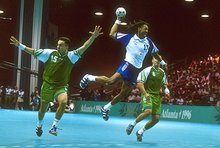Fluid losses during exercises impair athlete's performance by:
- increase heart rate
- impaired heat regulation
- increased perceived exertion: athlete fatigues faster
- reduced mental function
- reduced skill level
- stomach upset
For example, if an athlete finishes an exercise session 1kg lighter and has consumed 1 litre of fluid during the session, total sweat loss equals 2 litres. Once an athlete's average sweat loss is known, a plan can be prepared to enable the athlete to match sweat losses in subsequent exercise sessions.
- have a palatable flavour to encourage greater fluid intake
- contain 6-8% carbohydrates
- contain electrolyte such as sodium and potassium
- non carbonated
Sports drinks are the preferred fluid for high intensity exercise. Sports drinks are flavoured therefore encourage a greater fluid intake. The carbohydrate and electrolytes in sports drinks promote better fluid absorption. The carbohydrate also provides a fuel source. Other fluids such as water, cordial and juice may be suitable when exercise intensity is low. However, this doesn’t mean sports drinks hydrate better than water.
Sports drinks don't hydrate better than water, but you are more likely to drink larger volumes, which leads to better hydration. The typical sweet-tart taste combination doesn't quench thirst, so you will keep drinking a sports drink long after water has lost its appeal. An attractive array of colors and flavors are available. You can get a carbohydrate boost from sports drinks, in addition to electrolytes which may be lost from perspiration, but these drinks tend to offer lower calories than juice or soft drinks.
Below are explanation of the benefit of common sports drinks ingredients:
Carbohydrate: While maintaining hydration is a primary goal, fluids containing an appropriate carbohydrate concentration will not harm water delivery and may enhance endurance performance. Carbohydrate is the primary fuel for muscular work at high intensities. The longer the exercise continues past one hour, the more likely it is that blood glucose will be used to help supply energy for muscle contraction. Thus, carbohydrate is recommended for inclusion in the fluid replacement beverage for exercise lasting longer than one hour. Usual guidelines recommend that the beverage be 6-8% carbohydrate and the delivery rate be 30-60 grams of carbohydrate per hour during endurance exercise lasting longer than one hour.
Sodium: Sodium is the main electrolyte in sports drinks. Including sodium in fluid replacement beverages for activities lasting less than one hour is not necessary but the presence of sodium in the beverage may enhance palatability and maintain the athlete's drive for thirst. Thus, the athlete may drink more fluid and stay better hydrated during exercise when the beverage contains a small amount of sodium. For exercise lasting longer than 4-5 hours, drinking a beverage containing sodium helps offset sodium loss in sweat. In addition, the osmotic pressure exerted by sodium helps maintain blood volume, especially during prolonged endurance or ultra-endurance exercise.
Therefore, drink your fluid before any exercise even for training session.






1 comment:
You write very well.
Post a Comment